Monishwaran Maheswaran
Residual Context Diffusion Language Models
Jan 30, 2026Abstract:Diffusion Large Language Models (dLLMs) have emerged as a promising alternative to purely autoregressive language models because they can decode multiple tokens in parallel. However, state-of-the-art block-wise dLLMs rely on a "remasking" mechanism that decodes only the most confident tokens and discards the rest, effectively wasting computation. We demonstrate that recycling computation from the discarded tokens is beneficial, as these tokens retain contextual information useful for subsequent decoding iterations. In light of this, we propose Residual Context Diffusion (RCD), a module that converts these discarded token representations into contextual residuals and injects them back for the next denoising step. RCD uses a decoupled two-stage training pipeline to bypass the memory bottlenecks associated with backpropagation. We validate our method on both long CoT reasoning (SDAR) and short CoT instruction following (LLaDA) models. We demonstrate that a standard dLLM can be efficiently converted to the RCD paradigm with merely ~1 billion tokens. RCD consistently improves frontier dLLMs by 5-10 points in accuracy with minimal extra computation overhead across a wide range of benchmarks. Notably, on the most challenging AIME tasks, RCD nearly doubles baseline accuracy and attains up to 4-5x fewer denoising steps at equivalent accuracy levels.
ETS: Efficient Tree Search for Inference-Time Scaling
Feb 19, 2025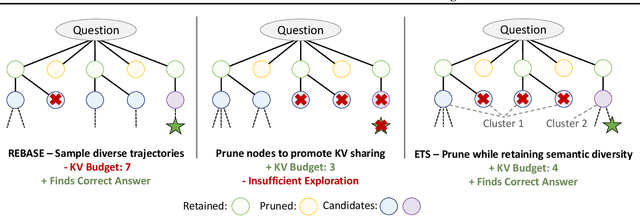
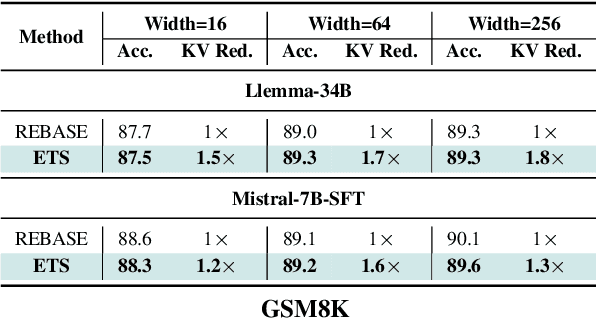
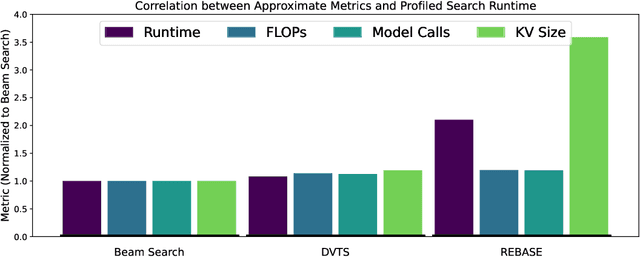

Abstract:Test-time compute scaling has emerged as a new axis along which to improve model accuracy, where additional computation is used at inference time to allow the model to think longer for more challenging problems. One promising approach for test-time compute scaling is search against a process reward model, where a model generates multiple potential candidates at each step of the search, and these partial trajectories are then scored by a separate reward model in order to guide the search process. The diversity of trajectories in the tree search process affects the accuracy of the search, since increasing diversity promotes more exploration. However, this diversity comes at a cost, as divergent trajectories have less KV sharing, which means they consume more memory and slow down the search process. Previous search methods either do not perform sufficient exploration, or else explore diverse trajectories but have high latency. We address this challenge by proposing Efficient Tree Search (ETS), which promotes KV sharing by pruning redundant trajectories while maintaining necessary diverse trajectories. ETS incorporates a linear programming cost model to promote KV cache sharing by penalizing the number of nodes retained, while incorporating a semantic coverage term into the cost model to ensure that we retain trajectories which are semantically different. We demonstrate how ETS can achieve 1.8$\times$ reduction in average KV cache size during the search process, leading to 1.4$\times$ increased throughput relative to prior state-of-the-art methods, with minimal accuracy degradation and without requiring any custom kernel implementation. Code is available at: https://github.com/SqueezeAILab/ETS.
Squeezed Attention: Accelerating Long Context Length LLM Inference
Nov 14, 2024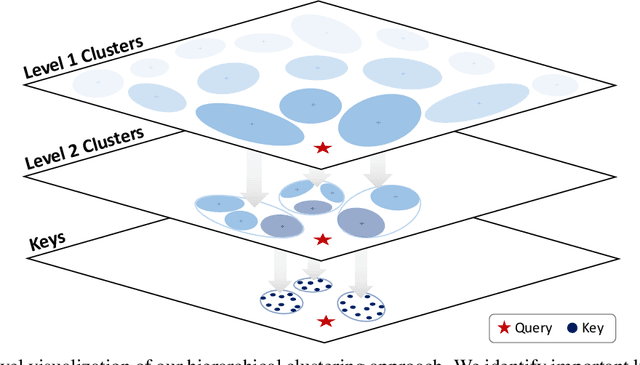

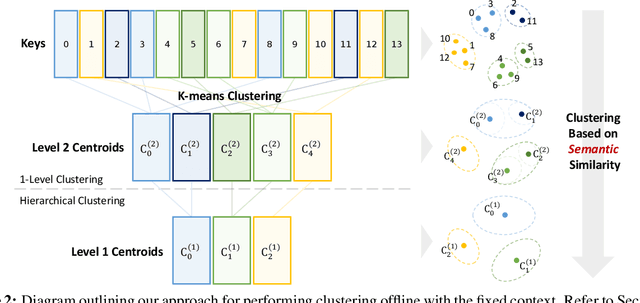
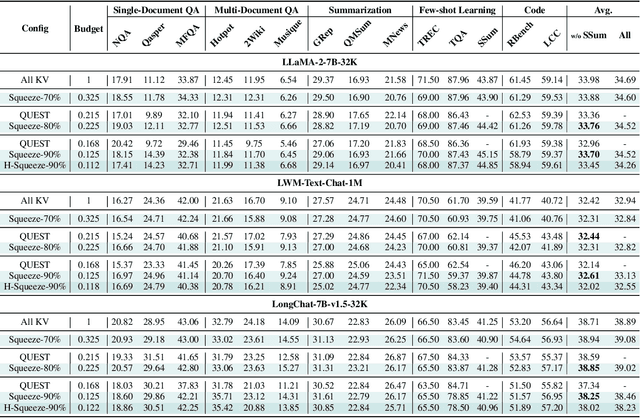
Abstract:Emerging Large Language Model (LLM) applications require long input prompts to perform complex downstream tasks like document analysis and code generation. For these long context length applications, the length of the input prompt poses a significant challenge in terms of inference efficiency since the inference costs increase linearly with sequence length. However, for many of these applications, much of the context in the prompt is fixed across different user inputs, thereby providing the opportunity to perform offline optimizations to process user inputs quickly, as they are received. In this work, we propose Squeezed Attention as a mechanism to accelerate LLM applications where a large portion of the input prompt is fixed. We first leverage K-means clustering offline to group the keys for the fixed context based on semantic similarity and represent each cluster with a single centroid value. During inference, we compare query tokens from the user input with the centroids to predict which of the keys from the fixed context are semantically relevant and need to be loaded during inference. We then compute exact attention using only these important keys from the fixed context, thereby reducing bandwidth and computational costs. We also extend our method to use a hierarchical centroid lookup to identify important keys, which can reduce the complexity of attention from linear to logarithmic with respect to the context length. We implement optimized Triton kernels for centroid comparison and sparse FlashAttention with important keys, achieving more than 4x speedups during both the prefill and generation phases for long-context inference. Furthermore, we have extensively evaluated our method on various long-context benchmarks including LongBench, where it achieves a 3x reduction in KV cache budget without accuracy loss and up to an 8x reduction with <0.5 point accuracy gap for various models.
 Add to Chrome
Add to Chrome Add to Firefox
Add to Firefox Add to Edge
Add to Edge